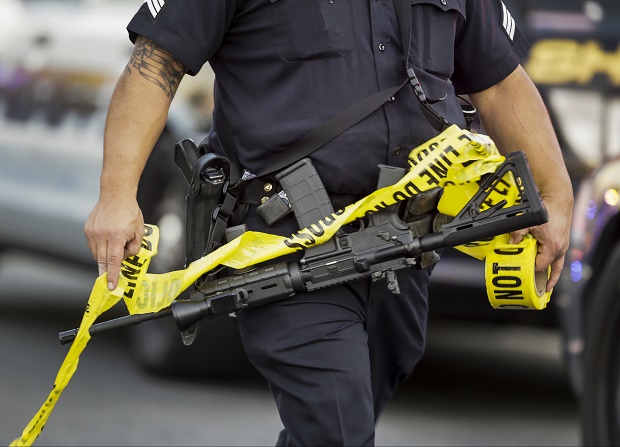
A police officer deploys tape to an area near where authorities stopped a vehicle in San Bernardino, Calif., Wednesday, Dec. 2, 2015. Multiple attackers opened fire on a banquet at a social services center for the disabled in San Bernardino on Wednesday, killing multiple people and sending police on a manhunt for suspects. AP
HOOVER, Alabama — Anita Jefferson didn’t know much about San Bernardino, California, before the apparent terror attack there. The West Coast town is nearly the exact same size as her hometown of Birmingham and hardly a high-profile target like New York or Paris.
Now, she finds herself worried about the possibility of an attack at a location like the suburban shopping mall where Jefferson works at a food kiosk for the Christmas shopping season. A place that’s public but, unlike stadiums and other venues, has relatively lax security.
“You’d think they’d go to a larger place, but a smaller place may be easier,” said Jefferson, 62.
The FBI announced Friday that it was investigating the mass shooting that left 14 people dead at a Christmas party as an act of terrorism. The couple who carried out the shooting, Syed Farook and his wife, Tashfeen Malik, died in a gunbattle with police.
If there could be a terror attack at a social services center in San Bernardino, why not suburban Alabama, or downtown Louisville, Kentucky? The bloody massacre made it all too obvious for some Americans that big cities with marquee names aren’t the only potential targets.
“I can honestly say I don’t feel as safe,” said Tim Harrington, 50, of Jacksonville, Florida, while touring a museum in Louisville.
READ: California shooting—what we know so far
There is plenty of security at the suburban Birmingham mall — “and they’re awesome,” said Lindsay Alexander, 18, who also works there and feels safe. But her comfort level isn’t what it was a few days ago.
“It could happen here,” said Alexander. “They could just pick something random.”
Psychology professor Marjorie Sanfilippo doesn’t believe people will change their behavior because of the San Bernardino shootings.
“People are very resilient tend to get back to their regular lives,” said Sanfilippo, who teaches at Eckerd College in St. Petersburg, Florida.
But, she cautioned, that could change if there were more “random attacks” in public places, such as coffee shops.
“That’s when I think we would see fear,” said Sanfilippo.
Residents in Lincoln, Nebraska — which didn’t experience its first homicide of 2015 until last month — said the attacks hadn’t affected their sense of security.
“If they’re looking for a mass killing, they’re going to go to places with more people,” said Nate Jurgensmeier, a 19-year-old sophomore at the University of Nebraska-Lincoln. “They’re not going to kill nearly as many people if they crash into a dorm building or a building in downtown Lincoln.”
Matt Eckhardt, 30, of Lincoln also considers his city safe.
“If you were living in New York, I think your perspective would be a lot different than ours,” Eckhardt said.
Yet in Louisville, Nautica Delacruz of Los Angeles said the attacks in her home state had shaken her sense of security.
“You kind of just want to go to work and home, or pick up your kid and go straight home,” she said. “You really don’t want to go anywhere. You kind of feel like you’re violated in a sense of your freedom, in a way. You don’t feel safe going anywhere anymore.”
READ: US mass shooting prompts White House recriminations
At the Louisville museum, Harrington said the threat of terror already is making him re-evaluate his safety. He has cut back on international travel for business, and he said he doesn’t feel as safe as he once did in office buildings.
Harrington said he isn’t changing domestic travel plans, and he feels secure going to NFL games in his hometown of Jacksonville, Florida.
“But definitely, I think if I’m in a crowd of people outside where I don’t see policemen, I’d kind of be a little bit more fearful,” he said.
Standing in the middle of the Alabama mall crowded with holiday shoppers, a brightly lit carousel twirling in the food court, Jefferson said she is doing her best not to worry, but: “It’s in the back of your head.”